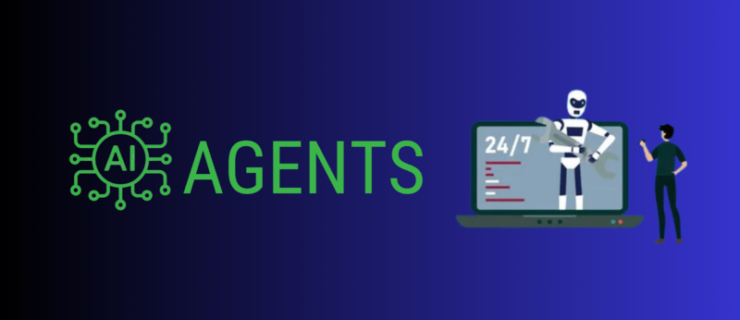Artificial intelligence (AI) is transforming the way we interact with technology, and one of the most exciting and versatile aspects of this transformation is the concept of AI agents. These intelligent systems are capable of performing tasks, making decisions, and adapting to their environment without direct human intervention. But how do AI Agents work? Let’s break it down.
What Are AI Agents?
At their core, AI agents are autonomous systems designed to carry out specific tasks or solve problems by making decisions based on inputs they receive from their environment. These agents can be software programs, robots, or virtual entities, but what makes them “agents” is their ability to act upon the world around them in a way that aims to achieve a particular goal.
Types of AI Agents
AI agents can be categorized based on their level of autonomy, learning capabilities, and the complexity of tasks they can handle. Common types include:
- Reactive Agents: These agents respond to specific stimuli in their environment based on predefined rules.
- Deliberative Agents: These agents plan their actions and choose the most appropriate course of action based on reasoning.
- Learning Agents: These agents use machine learning to improve performance over time based on past experiences.
- Autonomous Agents: Capable of operating independently, these agents make decisions and adapt to new situations without human intervention.
How Do AI Agents Work?
AI agents operate through a combination of perception, reasoning, and action. Steps:
- Perception (Input Processing) : The first step in an AI agent’s operation is perception, where the agent gathers data from its environment. For example, robots use sensors to detect objects, while virtual agents rely on natural language processing (NLP) to understand text input.
- Reasoning (Decision-Making) : Once the agent has gathered data, it must decide what action to take. This involves reasoning, which could be rule-based, model-based, or learning-based, depending on the complexity of the agent.
- Action (Execution) : After processing the data, the agent takes action to achieve its goal. Whether it’s navigating a robot or recommending a product, the agent’s action impacts its environment, which is then fed back into the perception system for continuous improvement.
AI Agents in the Real World
AI agents have made their way into numerous applications, both visible and invisible. Some examples include:
- Virtual Assistants: Tools like Siri and Alexa help users with everyday tasks by processing commands and taking action.
- Robotics: Autonomous robots are used in manufacturing, warehousing, and home cleaning (e.g., Roomba).
- Self-Driving Cars: AI agents in self-driving cars navigate roads by processing sensory data and making decisions about speed, direction, and safety.
- Recommendation Systems: Platforms like Netflix and Spotify use AI agents to suggest content based on user preferences and past behavior.
- Chatbots and Customer Support: AI agents provide support in customer service by answering queries, resolving issues, and escalating complex problems to humans when necessary.
Key Characteristics of AI Agents
AI agents are characterized by several features that enable them to function effectively:
- Autonomy: The ability to act independently without constant human oversight.
- Adaptability: The capacity to adjust to changing environments and new information.
- Interactivity: AI agents must be able to communicate and interact with their environment, including humans.
- Goal-Oriented: AI agents are designed to achieve specific objectives or solve problems.
The Impact of AI Agents on the Crypto and Digital Ecosystem
AI agents are transforming the crypto and digital ecosystem by enhancing trading strategies, automating processes, and improving security. In cryptocurrency markets, AI-powered bots optimize trading, predict market trends, and reduce human error. AI also strengthens security through fraud detection and smart contract audits. Furthermore, AI enhances DeFi protocols by optimizing lending, borrowing, and liquidity management.
Challenges in AI Agent Development
While AI agents hold great potential, their development comes with certain challenges:
- Bias in AI: AI agents can inherit biases from training data, leading to unfair or inaccurate decisions.
- Complexity and Computation: Creating highly sophisticated AI agents requires significant computational power and complex algorithms.
- Ethical Concerns: The autonomy and decision-making capabilities of AI agents raise ethical questions about accountability, fairness, and privacy.
The Future of AI Agents
The future of AI agents is exciting, with many advancements on the horizon:
- General AI Agents: While current AI agents are specialized (narrow AI), there is ongoing research into developing general AI agents capable of handling a variety of tasks across different domains.
- Human-AI Collaboration: Rather than replacing humans, AI agents are expected to work alongside people, augmenting their capabilities and improving productivity.
Conclusion
AI agents are a pivotal part of the AI revolution, offering intelligent solutions to a wide range of tasks across industries. From virtual assistants to self-driving cars, their applications are expanding rapidly.
As they evolve, understanding their inner workings, challenges, and ethical implications will be crucial to ensuring they are deployed responsibly and effectively. The future of AI agents holds immense promise, but it’s essential to ensure they are developed with fairness, transparency, and human collaboration in mind.





